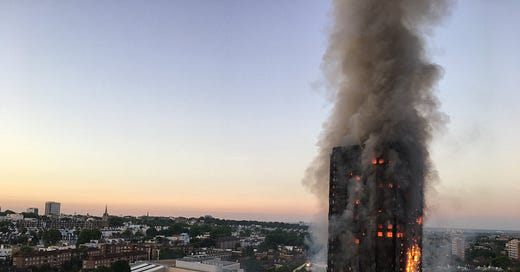Grenfell Tower Fire: Leaders can Never Disown Culture
Culture is always the responsibility of leaders - even if they turn a blind eye
“Kingspan has long acknowledged the wholly unacceptable historical failings that occurred in part of our UK insulation business. These were in no way reflective of how we conduct ourselves as a Group, then or now. While deeply regrettable, they were not found to be causative of the tragedy.”
Kingspan’s Website the day after the publication of Phase 2 of the Grenfell Tower Fire
Reading the above it would appear that Kingspan had no part to play in the Grenfell Tower tragedy on the 14th June 2017 in which 72 people lost their lives.
Phase 2 of the Inquiry, published in September 2024 suggests otherwise
The report found Kingspan, headquartered in County Cavan, Ireland, demonstrated "complete disregard for fire safety" and "deeply entrenched and persistent dishonesty" in marketing its product, Kooltherm K15. While not directly responsible for the Grenfell fire, Kingspan created a false market for K15, claiming it passed the BS 8414 safety test and was safe for high-rise buildings. Subsequent testing showed disastrous results, but Kingspan didn't withdraw the product. The firm cynically exploited industry ignorance, misleading the market for years.
Kingspan - Culture and Conduct
The Grenfell Tower Inquiry: Phase 2 Report highlights significant failings in the conduct and culture of Kingspan, specifically in the context of product testing, marketing, and regulatory compliance. Below are the key findings about Kingspan as per the report:
Key Findings Regarding Kingspan:
False Market Creation:
From 2005 until after the Inquiry began, Kingspan knowingly created a false market in insulation for use on buildings over 18 metres in height.
BS 8414 Test Misrepresentation:
Kingspan falsely claimed that their K15 product was part of a system that passed the BS 8414 test and could be used broadly in high-rise buildings, despite knowing it was a method for testing complete wall systems
Product Modification Concealment:
After changing the composition of K15 in 2006, Kingspan continued to rely on a 2005 test result of a different product composition without disclosing this change in subsequent certifications and marketing
Deception in Marketing and Certification:
Kingspan did not withdraw K15 after disastrous test results in 2007 and 2008. They concealed these results and continued to market and sell K15 based on misleading certificates
Compliance with Approved Document B:
Misled the market with the BBA certificate by suggesting K15 complied with the fire safety regulations for use in buildings over 18 metres without proper evidence
Design and Safety Oversight:
Exploited a widespread ignorance of BS 8414 and BR 135 standards within the industry to push their product onto high-rise buildings without adequate safety assurances
“The effect of Kingspan’s dishonest marketing of K15 was to create a spurious market for a polymeric insulation product suitable for use on high-rise buildings generally, which drew in Celotex as a competitor.”
Let’s just remind ourselves of Kingspan’s recent press release about these behaviours:
“These were in no way reflective of how we conduct ourselves as a Group, then or now.”
Yet in a report from the Inquiry Kingspan staff joked, ‘All we do is lie’ about the fire safety of their products, revealing a culture of dishonesty and manipulation."
Organisational culture is never the product of rogue individuals within a company. As we’ve seen from the Volkswagen Emissions Scandal which attempted to blame engineers for the scandal, whereas their behaviour was a direct result of company strategy - which eventually led to the resignation of the CEO.
Kingspan’s approach appears to follow the same trajectory, which is to say there was nothing wrong with the culture of the organisation at the time.
Such a claim defies all logic as the behaviour of employees is always a consequence of company culture - either consciously or unconsciously.
Our work with the Culture Footprint has reinforced this belief that leaders wield immense power. They can shape and influence the culture within their organisations, but if they let this responsibility go unmanaged, culture will inevitably shape people’s behaviour in unpredictable and often counterproductive ways.
It appears that Kingspan leaders, at the time, either abdicated responsibility for their culture (because it suited company results), or worse, informally supported such behaviour by turning a blind eye. Either way Kingspan should stand up and accept their role in creating a market which, although they weren’t directly involved in supplying products to Grenfell, contributed significantly to creating an environment where a disaster was simply waiting to happen.
Their new Code of Conduct sets out how new employees should behave:
“Kingspan expects the highest standards of integrity, honesty and compliance with the law from our employees, our directors and our partners, globally. We actively encourage our employees to speak out if they experience instances that are not in keeping with the principles outlined in our Code of Conduct.”
Clear, ethical and honest behaviours and communications;
Compliance with the law;
Respect for the safety and wellbeing of colleagues;
Protection of our Group assets; and
Upholding our commitment to a more sustainable future
It’s a real shame that Kingspan didn’t live these out more explicitly 20 years ago, and, face up to the fact that their leaders certainly didn’t live up to number 1 - and possibly 2
Now they really would be living out these values if their current leaders were to admit the company got things wrong ‘then’, rather than attempting to stonewall any blame.






Thanks for this. I hadn't realised the cladding had been tested, found to be unsafe and THEN continued to be marketed anyway. Complete lack of integrity, leading to dire consequences